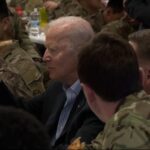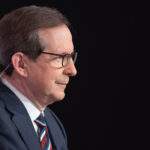
Removing Russian President Vladimir Putin from power is not on Washington’s agenda, the top U.S diplomat said Sunday, as Ukraine’s leader issued another impassioned plea to allies for additional weaponry to hold off invading Russian forces.
President Biden’s dramatic Saturday declaration — “For God’s sake, this man cannot remain in power,” a reference to Putin — has prompted a frantic effort from U.S. officials to walk back what appeared to be a White House endorsement of a shift of government in Moscow.
“We do not have a strategy of regime change in Russia, or anywhere else, for that matter,” Secretary of State Antony J. Blinken told reporters in Jerusalem on Sunday. “In this case, as in any case, it’s up to the people of the country in question, it’s up to the Russian people.”
Biden’s off-the-cuff remarks in Warsaw at the finale of a rousing, pro-Ukrainian speech — evoking memories of Cold War and the late Pope John Paul II while exhorting allies to stand up to Russia — have prompted a firestorm of criticism, especially at a moment when some fear the war in Ukraine could escalate into a larger, even more catastrophic conflict.
Biden’s comments “made a difficult situation more difficult and a dangerous situation more dangerous,” Richard Haass, a veteran U.S. diplomat and chairman of the New York-based Council on Foreign Relations, wrote on Twitter. “This is obvious. Less obvious is how to undo the damage,” he added, suggesting that Biden’s team make it clear that they are indeed willing to deal with the current Russian leadership.
In Jerusalem, Blinken said Biden’s comments were not meant to suggest that the Russian president should be replaced. Rather, Blinken said, Biden’s point was that Putin “cannot be empowered to wage war or engage in aggression against Ukraine or anyone else.”
The reaction in Moscow was predictably dismissive. “The president of Russia is elected by Russians,” Dmitry Peskov, a Kremlin spokesman, told reporters.
The Ukrainian war and its images of destruction and mass displacement have clearly prompted Biden to ramp up his verbal attacks against Putin, whom he has labeled killer, war criminal and, while in Warsaw on Saturday, a “butcher.” The comments have come as peace talks between Russia and Ukraine to end the conflict appear to have stalled.
The Russian invasion has resulted in thousands of casualties and vast damage to Ukrainian cities and infrastructure. It also has displaced more than 10 million people, almost one-quartet of Ukraine’s population. More than 3.7 million refugees have fled the country, according to the United Nations, making it the largest refugee upheaval in Europe since World War II.
Fighting and shelling continued Saturday across several fronts, authorities said, as Britain’s defense ministry said that Russian forces appear to be attempting to encircle Ukrainian forces arrayed against pro-Russian separatist fighters in the eastern part of the country. Russia has said that its war aims now are based on consolidating gains in the eastern Donbas region, home of two pro-Moscow breakaway republics.
Russian troops continue battling for control of several key Ukrainian cities, including Kharkiv in the northeast and the strategic port city of Mariupol in the south. Ukrainian forces have put up stiff resistance in various urban areas, including in Kyiv, the capital.
Following Biden’s speech Saturday, Ukrainian President Volodymyr Zelensky made another impassioned plea to his allies for more arms, stressing that Ukraine was requesting no more than one percent of NATO’s stocks of aircraft and tanks.
“Ukraine cannot shoot down Russian missiles using shotguns, machine guns,” Zelensky said in a speech late Saturday.
The president alluded to the besieged eastern city of Mariupol, where images of shell-battered apartment towers, hospitals and shopping centers have come to epitomize the destruction wrought by the war.
“It is impossible to unblock Mariupol without a sufficient number of tanks, other armored vehicles and, of course, aircraft,” Zelensky said “All defenders of Ukraine know that. All defenders of Mariupol know that.”
In another jab at Moscow, Zelensky said that the war — which Putin has said was launched in part to protect Ukrainians with “blood ties” to Russia — was having the opposite effect: Stigmatizing a language that has long existed alongside Ukrainian as a native tongue for many Ukrainians, especially in the east and south.
“Russia itself is doing everything to ensure that de-Russification takes place on the territory of our state,” Zelensky said. “This is another manifestation of your suicide policy,” he added, directing his remarks at Moscow.
Meanwhile, the western city of Lviv was still reeling Sunday from a pair of missile strikes Saturday afternoon that shattered the relative calm in a city that has largely been spared from the war, though it has been a hub for the war-displaced multitudes. Many residents speculated that the volley of Russian missiles, which hit a fuel depot and a military installation, were intended as a message to Biden, who was in nearby Poland when the attacks occurred.
“With these strikes the aggressor wants to say, ‘Hello,’ to President Biden,” Andriy Sadoviy, Lviv’s mayor said late Saturday.
No one was killed in the two strikes in Lviv, authorities said. Both volleys appeared to hit their objectives with precision, despite the proximity of residential districts to the targets.
Lviv appeared calm Sunday as people attended church services, stopped at busy cafes and restaurants, and strolled in the streets of the cobble-stoned historic center. But the attacks were another reminder that the war was not just isolated to the embattled environs of Kyiv, 335 miles to the east, and to beleaguered cities in the far-away south, east and north.
“Of course it makes one nervous — this conflict is not a video game any more,” said Borys Babelashvili, 59, a shop owner who was walking his dog in the esplanade facing the city’s 19th-century opera house. “It’s natural to be worried. But one has to go on with one’s life.”
Nearby, two displaced families from the war-battered northeastern city of Kharkiv, Ukraine’s second-most populous after Kyiv, said they heard about the strikes after arriving here by train late Saturday. That Lviv was now in the cross-hairs of Russian cruise missiles wasn’t a welcome development. They had already experienced too many air and artillery attacks in Kharkiv.
“I hope the war is not following us here,” said Natasha Barsukova, 17, traveling with two siblings and her mother. “No, we don’t feel safe in Lviv either. We are moving on.”
The two families — two women and four children — were planning to leave the next day for Dusseldorf, Germany, one of many destinations for Ukrainian refugees.
Still remaining in Kharkiv are the children’s fathers who, as military-aged men, are barred from leaving the country. Such separations are the norm in Ukraine now, as men bid goodbye to departing wives and children, mothers, sisters, girlfriends and others, who head daily head out from besieged areas on foot, in cars, buses and trains for the relative safety in the country’s west and beyond.
Times staff writers Tracy Wilkinson in Washington and Kate Linthicum in Mexico City contributed to this article.
This story originally appeared in Los Angeles Times.




